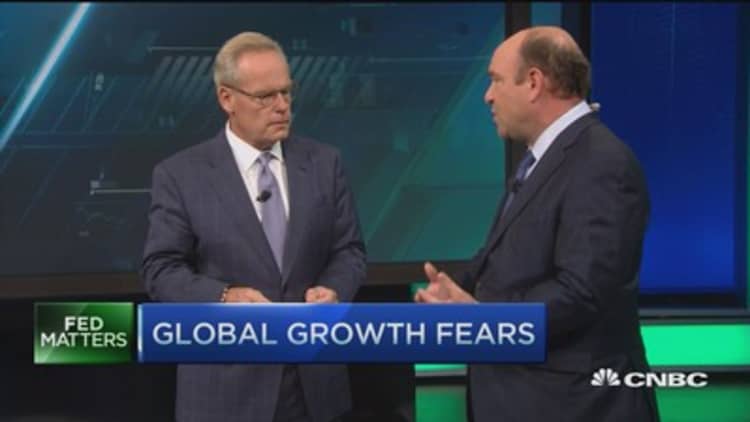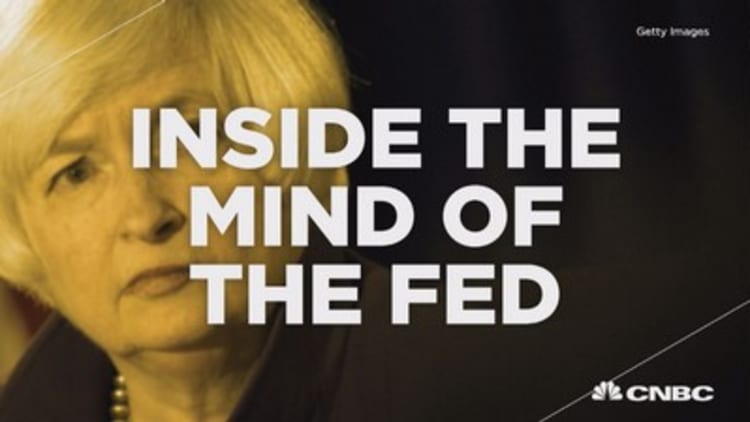China's stock market selloff is unlikely to slow the Fed's path to rate hikes, unless it creates an economic slowdown or deflationary spiral that slams the global economy.
The Fed begins its two-day meeting Tuesday, but economists mostly expect little news from the U.S. central bank when it releases its statement Wednesday afternoon. The majority of economists forecast the Fed will raise rates for the first time in September, unless the economic data soften significantly or there is some other shock to the system—and China could potentially create a shock.
"Financial stability matters. If there's a huge mess and fallout from China that's destabilizing when they go to raise rates, they'll have to postpone it," said Mesirow Financial's chief economist, Diane Swonk.

For now, however, she expects the Fed to move toward a September rate hike, and while it should discuss the issues surrounding China's market, its economic slowing and the global commodities selloff, that should not be mentioned in the Wednesday statement.
The commodities rout has been blamed on multiple catalysts, including the prospect of Fed rate increases that would send the dollar higher and weigh on commodities. The selloff has also been tied to oversupply in some markets, such as oil and in metals, like copper and iron ore, and that could be a direct result of slower Chinese buying.
Grains were hammered once again Monday, with corn down 4 percent. were trading under $1,100 per ounce. West Texas Intermediate crude futures, which fell below $50 per barrel last week, were trading just above $47 per barrel Monday.
"China has taken the gas off of commodity prices. But commodity prices alone aren't enough either" to stop the Fed, Swonk said. "There are positives associated with lower oil, and oil is especially positive for Europe."
There have been worries that falling commodities prices will lead to deflation, while the Fed has been looking for a pickup in inflation to support a rate hike.
How should you China proof your portfoilio?
"They (the Fed) really want to get it done in September," said Swonk of the rate increase. "It's symbolic. I think the threshold on the second move is a lot higher. They're willing to do it in September without inflation and they're willing to call it pre-emptive because there's not inflation yet. If the world blows up in September and the world is in turmoil, they're not going to move."
JPMorgan's chief U.S. economist, Michael Feroli, said the Fed will not dwell on the dramatic Chinese stock market selloff. lost nearly 8.5 percent Monday in their biggest one day drop in eight years.
"I don't think it will be a huge issue. I think they will focus more on the Chinese real economy rather than financial markets: The latest China data indicate more of a soft landing than a crash, and that is probably a helpful development in the long run, so I don't (think) Chinese equities, which are volatile and still up big over a year ago, will be the No. 1 issue for them," he wrote in an email.
Swonk said the Chinese slowdown already has had a chilling effect on the developing world, as emerging markets depend on commodities exports. But it's difficult to say how much the stock market will spill over to worsen the softening of the broader economy. The Chinese government has been taking measures to slow the selloff, which came after Chinese stocks skyrocketed over the past year.
Shanghai stocks were up 60 percent in the first half of the year, falling 30 percent since the June peak. Those shares are widely held by individuals who used margin lending to boost holdings as prices soared.
Wall Street has largely downplayed the spillover effects since China has a lot of latitude to influence its economy. For instance, regulators have also been heavy handed with the stock market, taking steps against short selling and requiring certain shareholders to refrain from selling.
After Monday's rout, China said it was prepared to buy shares to stabilize the market and avoid "systemic risks." China's securities regulator also said market authorities would deal with anyone who was involved in the "malicious shorting of stocks."
"They do have ways of circumventing things and creating growth on demand, but there's a lot of debt on the regional level," Swonk said.
She said the Chinese economic data have also been troubling. "Our forecast is a little over 6 percent (growth) this year and may be nibbling below 6 percent next year. That's close to a hard landing in China," she said. "They underestimate when they're growing rapidly and overestimate when they're growing slowly."
But for the Fed to react, the signs of China's impact on the world economy will have to get much worse.

Bank of Tokyo-Mitsubishi's chief financial economist, Chris Rupkey, said the U.S. central bank is not likely to mention China in its statement Wednesday, and Fed Chair Janet Yellen already addressed it in recent testimony on Capital Hill.
"Yellen was asked this point blank in the testimony before Congress and she said, 'No, the FOMC members when they made their forecast in June realized there was something going on in Greece, Europe and China, and they made their forecasts anyway,'" Rupkey said.
He does expect the Fed to discuss China.
"You've got the IMF out there saying, 'China stop buying stocks.' If I had to guess, the FOMC members think what's going on in China is a little beyond what a country's Treasury, a country's finance minister or a country's central bank should be doing—intervening a little too much in the market," said Rupkey.
"I think they just think there's a stock bubble ... I don't think they're going to look at that as something that ruins the world economy, but it's still playing out. If this all blows up in the coming months into the Asian financial crisis of '97 redux, they'll probably delay it (the rate hike), It's not that bad yet. Stock markets around the would have to start going down in response."
Swonk said she's worried about China, and its outsized potential to influence the world economy.
"It's an 800-pound gorilla. It's a real economy that eats, and you can't ignore it and when it doesn't eat, the rest of us feel it too," she said.


